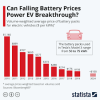Rorschach
Sonny Walters
The wind is always blowing somewhere in the UK so obviously, it never goes to zero. Even with the unprecedented drop-off this year it still supplied about 15% of that 25% you referenced. So the answer is plainly spare capacity and storage. This exact problem caused much hand ringing over the years among green energy advocates but the market is in the process of solving it, you'll be glad to hear. The price of renewable energy and storage is dropping like a stone. And let's face it, it is going to get a lot windier anyway.10% of the total generation missing is probably accurate, although that's not how electricity generation works.
Wind power is around 25% of the generated electricity in the UK, so it's 25% that needs to be covered when the wind isn't blowing. As that proportion increases, more needs to be covered when it's not available.
The current situation in the UK is a result of multiple issues happening at once and could probably be accurately be described as unprecedented. Less wind on top of several nuclear reactors going offline and a fire on the France interconnector is bad luck. Having very little gas storage is bad planning, especially knowing the Brexit would put the UK in a vulnerable position in the market if the worst happened (like now).


